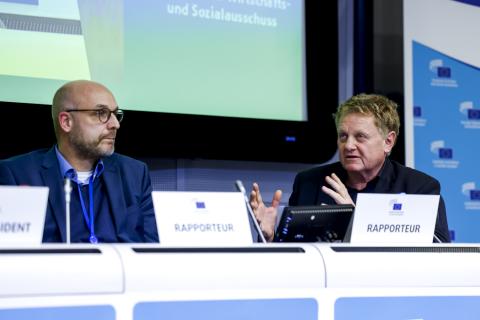European Economic
and Social Committee
European Media Freedom Act: an important cornerstone in the defence of media freedom
The EESC welcomed the European Commission's initiatives for media freedom, but warned that mere recommendations and a soft-law approach would not be enough to ensure that the media in Europe remains free and independent from political, commercial and other types of interference.
In its opinion on the European Media Freedom Act (EMFA) (Proposal for a Regulation and Recommendation), the EESC pointed out that media freedom and diversity are fundamental for the rule of law and liberal democracy.
"Media freedom is in danger. Authoritarianism is on the rise, including in Europe. The fourth estate is a firewall against this illiberal onslaught. Therefore, strengthening media freedom is paramount and the EMFA is an important and very timely initiative," said the rapporteur for the opinion, Christian Moos.
"We are observing more and more political and economic interference in several EU countries, both in public and in private media with close links to power, which is incompatible with the role of media as the fourth estate," said co-rapporteur Tomasz Andrzej Wróblewski.
The EESC gave its full support to the proposals that strengthen and defend the editorial independence of journalists and publishers. It also placed particular focus on the independence and impartiality of public media, pointing out that adequate and stable financial resources were needed to achieve this.
Another alarming problem identified by the opinion is the threat to media pluralism resulting from market concentration. Information monopolies certainly constitute a threat and taking action is warranted against media capture by media moguls and oligarchs.
Media ownership should be transparent and transparency requirements should be binding, although this should not lead to an excessive administrative burden for small media outlets. The lack of independence of some national regulatory bodies is also worrying. If not fully independent, they should not participate in the proposed European Board for Media Services.
The EESC underscored that as a regulation, the EMFA will have direct effect. At the same time, it questioned whether the soft-law approach of the recommendation was an effective way of achieving the EMFA's objectives.
"Mere recommendations are not enough to guarantee media freedom and diversity in the Member States. Free and independent media must be binding criteria for the rule of law report and for triggering the mechanism in Member States where governments violate media freedom and independence", Mr Moos concluded. (ll)
